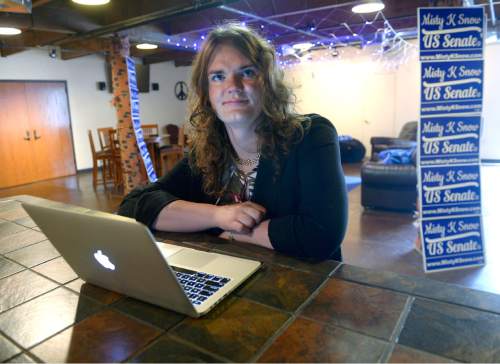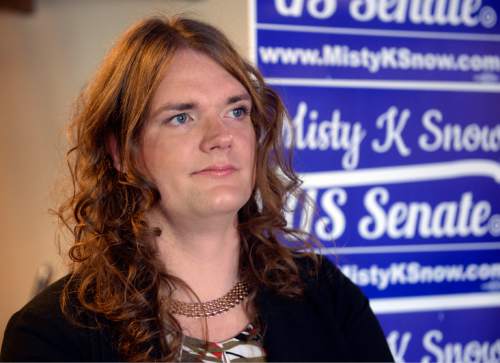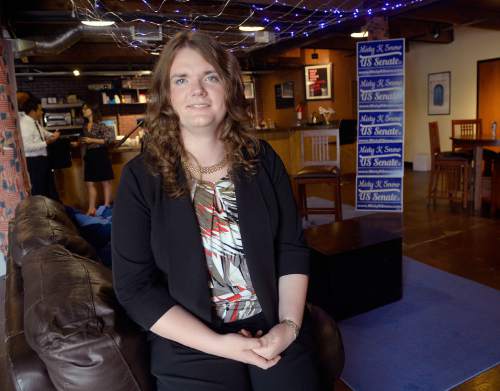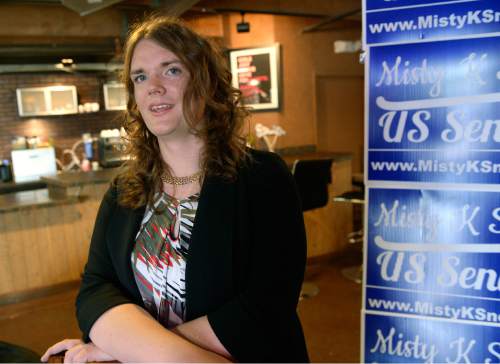This is an archived article that was published on sltrib.com in 2016, and information in the article may be outdated. It is provided only for personal research purposes and may not be reprinted.
Leaders of major gay-rights organizations are cheering on Misty K. Snow, who became Utah's Democratic Senate nominee with a convincing primary election victory Tuesday, and they say her campaign will help bring transgender people into the mainstream.
But they're not instantly endorsing her candidacy or funneling money into her race. While she is the first transgender nominee to represent a major party in a U.S. Senate race, she's still a Democrat running a statewide campaign in conservative Utah. That alone means the chances of beating first-term Sen. Mike Lee in November are slim. Add to her challenges that she isn't a well-known figure in Utah politics and has raised only $6,000, and there are obvious questions about the future trajectory of her campaign.
"Most of the gay organizations I know are very strategic, very miserly," said state Sen. Jim Dabakis, D-Salt Lake City, who is gay. "They involve themselves only in races where there is very little tokenism, and they get involved only when there is a considerable possibility of success."
Snow didn't make her LGBT status a main feature of her primary contest against Jonathan Swinton, a marriage counselor, whom she beat by roughly 20 percentage points. She's focused on a progressive platform inspired by presidential candidate Bernie Sanders, though, she has said she expects her historic status to lead to more media attention and more contributions.
Two of the biggest LGBT political organizations — the Human Rights Campaign and the Victory Fund — heralded Snow's success, but were not ready to go further.
"It is historic that this November, the top Utah Democrat on the ballot will be a transgender woman," said JoDee Winterhof, the senior vice president of policy and political affairs for the Human Rights Campaign. "Regardless of the outcome in the fall, this race shows transgender people across the country that our politics are stronger when diverse voices are not only heard, but also included."
The campaign's board votes on candidates to endorse using three criteria: support for LGBT issues, demonstrated community leadership and political viability, with an emphasis on endorsements, fundraising and polling. It has not taken a vote on Snow.
If she wants their support, she'll have to beef up her shoestring campaign and cut into Lee's advantage. That's exactly what she intends to do.
She's adding volunteers and expects to bring in more experienced advisers in the coming days, and she's hoping to negotiate with her employer, Harmon's grocery, for some time off in the months to come.
With Donald Trump as the Republican presidential candidate and Lee's consistently soft approval ratings, she believes she has a chance to make this race competitive.
Lee, one of the nation's most conservative senators, has focused his attention on what he calls "a reform agenda" focused on using GOP ideas to fight poverty.
"I'd like to congratulate Ms. Snow on her historic achievement," he said in a statement Wednesday. "Now that Utah's primary election is over, Utahns have a clear choice this fall."
Whether, Snow surges or not, Dabakis said: "I'm proud of Misty. I'm proud of the Democrats."
Once business-oriented Republicans rallied behind Lee last year, he said, "this became a very, very difficult seat for us to win."
He suggested Snow's victory over Swinton, a conservative Democrat who is Mormon, is a sign that Utah Democrats didn't want a "Mike Lee-light" in this long-shot bid.
"Why don't we put someone out there who will send a message and that's what I think happened," said Dabakis, a former chairman of the state Democratic Party.
When the primary results were released, Sophia Hawes-Tingey unexpectedly started to cry. A transgender woman, who will represent Utah at the Democratic National Convention in Philadelphia, she didn't realize how emotionally invested she was in Snow's race. They only met through this campaign.
"She has already won," Hawes-Tingey said. "She has won the hearts of people, many of whom have never known a transgender person — and she has done it as a loving, caring and brilliant woman."
Troy Williams, executive director of Equality Utah, said Snow and her transgender supporters have an opportunity "to introduce themselves to the state, and it is going to ignite a very exciting dialogue."
Equality Utah contributes to local races, but not federal ones, though Williams said the organization will "cheer her on every step of the way."
The Victory Fund's President Aisha Moodie-Mills said that introduction is important, and she hopes Snow's candidacy will be a step toward electing transgender people for public offices throughout the country.
"If we are not at the table, we are on the menu and that is what we are seeing all around the country," she said, referencing laws in places like North Carolina, which require transgender people to use the public bathrooms of their birth gender.
"When we have LGBT lawmakers in the room, it humanizes their lives, it humanizes the community," Moodie-Mills said.
The Victory Fund isn't endorsing Snow at this point or offering its assistance just yet.
The first transgender person in the nation to claim a major party nomination for federal office was the late Karen Kerin, who ran as a Republican against Bernie Sanders in 2000, when the independent was a House member. On Tuesday, Snow and Misty Plowright, a House candidate from Colorado, became the next two, and both of them are Sanders supporters.
Snow has heard from transgender individuals, and she hopes her candidacy "puts a positive face on the community and will be good for attention, awareness and acceptance."
But she's focusing more on the immediate tasks at hand. Building a campaign team, preparing to travel the state and raising the money needed to introduce herself to voters.
Twitter: @mattcanham









